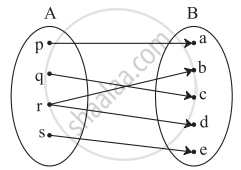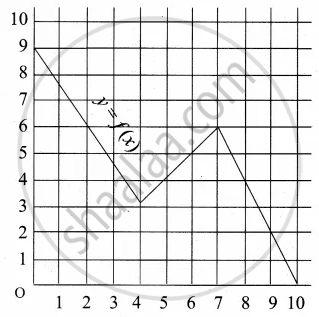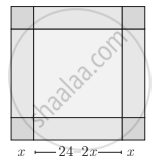Advertisements
Advertisements
Question
Answer the following:
For any base show that log (1 + 2 + 3) = log 1 + log 2 + log 3
Solution
L.H.S. = log (1 + 2 + 3) = log 6
R.H.S. = log 1 + log 2 + log 3
= 0 + log (2 × 3)
= log 6
∴ L.H.S. = R.H.S.
APPEARS IN
RELATED QUESTIONS
find: f(1), f(−1), f(0) and f(2).
Let X = {1, 2, 3, 4} and Y = {1, 5, 9, 11, 15, 16}
Determine which of the set are functions from X to Y.
(b) f2 = {(1, 1), (2, 7), (3, 5)}
If \[f\left( x \right) = \frac{x + 1}{x - 1}\] , show that f[f[(x)]] = x.
Let f and g be two real functions defined by \[f\left( x \right) = \sqrt{x + 1}\] and \[g\left( x \right) = \sqrt{9 - x^2}\] . Then, describe function:
(vii) f2 + 7f
If f(x) = loge (1 − x) and g(x) = [x], then determine function:
(iii) \[\frac{f}{g}\]
If f, g and h are real functions defined by
If f, g, h are real functions given by f(x) = x2, g(x) = tan x and h(x) = loge x, then write the value of (hogof)\[\left( \sqrt{\frac{\pi}{4}} \right)\] .
If f(x) = cos (loge x), then \[f\left( \frac{1}{x} \right)f\left( \frac{1}{y} \right) - \frac{1}{2}\left\{ f\left( xy \right) + f\left( \frac{x}{y} \right) \right\}\] is equal to
If \[f\left( x \right) = \frac{\sin^4 x + \cos^2 x}{\sin^2 x + \cos^4 x}\] for x ∈ R, then f (2002) =
The domain of definition of \[f\left( x \right) = \sqrt{\frac{x + 3}{\left( 2 - x \right) \left( x - 5 \right)}}\] is
The domain of definition of \[f\left( x \right) = \sqrt{4x - x^2}\] is
The range of the function \[f\left( x \right) = \frac{x}{\left| x \right|}\] is
Let \[f\left( x \right) = \sqrt{x^2 + 1}\ ] . Then, which of the following is correct?
If f(m) = m2 − 3m + 1, find f(− x)
If f(x) =` (2x−1)/ (5x−2) , x ≠ 2/5` Verify whether (fof) (x) = x
Check if the following relation is a function.

If f(m) = m2 − 3m + 1, find `f(1/2)`
If f(m) = m2 − 3m + 1, find f(x + 1)
Find x, if g(x) = 0 where g(x) = `(5x - 6)/7`
Find the domain and range of the following function.
f(x) = `root(3)(x + 1)`
Check the injectivity and surjectivity of the following function.
f : R → R given by f(x) = x2
Show that if f : A → B and g : B → C are one-one, then g ° f is also one-one
Express the following exponential equation in logarithmic form
10−2 = 0.01
Express the following logarithmic equation in exponential form
ln 1 = 0
Find the domain of f(x) = log10 (x2 − 5x + 6)
Write the following expression as a single logarithm.
`1/3 log (x - 1) + 1/2 log (x)`
If `log((x + y)/3) = 1/2 log x + 1/2 logy`, show that `x/y + y/x` = 7
Answer the following:
Let f : R – {2} → R be defined by f(x) = `(x^2 - 4)/(x - 2)` and g : R → R be defined by g(x) = x + 2. Examine whether f = g or not
Answer the following:
If `log (("a" + "b")/2) = 1/2(log"a" + log"b")`, then show that a = b
Answer the following:
Solve : `sqrt(log_2 x^4) + 4log_4 sqrt(2/x)` = 2
Answer the following:
If `log_2"a"/4 = log_2"b"/6 = log_2"c"/(3"k")` and a3b2c = 1 find the value of k
A graph representing the function f(x) is given in it is clear that f(9) = 2

Describe the following Range
A function f is defined by f(x) = 2x – 3 find `("f"(0) + "f"(1))/2`
An open box is to be made from a square piece of material, 24 cm on a side, by cutting equal square from the corner and turning up the side as shown. Express the volume V of the box as a function of x

If f(x) = `x^3 - 1/x^3`, then `f(x) + f(1/x)` is equal to ______.
Find the domain of the following functions given by f(x) = `1/sqrt(1 - cos x)`
Find the domain of the following function given by:
f(x) = `(3x)/(2x - 8)`
Let f(x) = `sqrt(x)` and g(x) = x be two functions defined in the domain R+ ∪ {0}. Find (fg)(x)
The domain of the function f given by f(x) = `(x^2 + 2x + 1)/(x^2 - x - 6)` is ______.
The range of the function f(x) = `""^(7 - x)P_(x - 3)` is ______.
